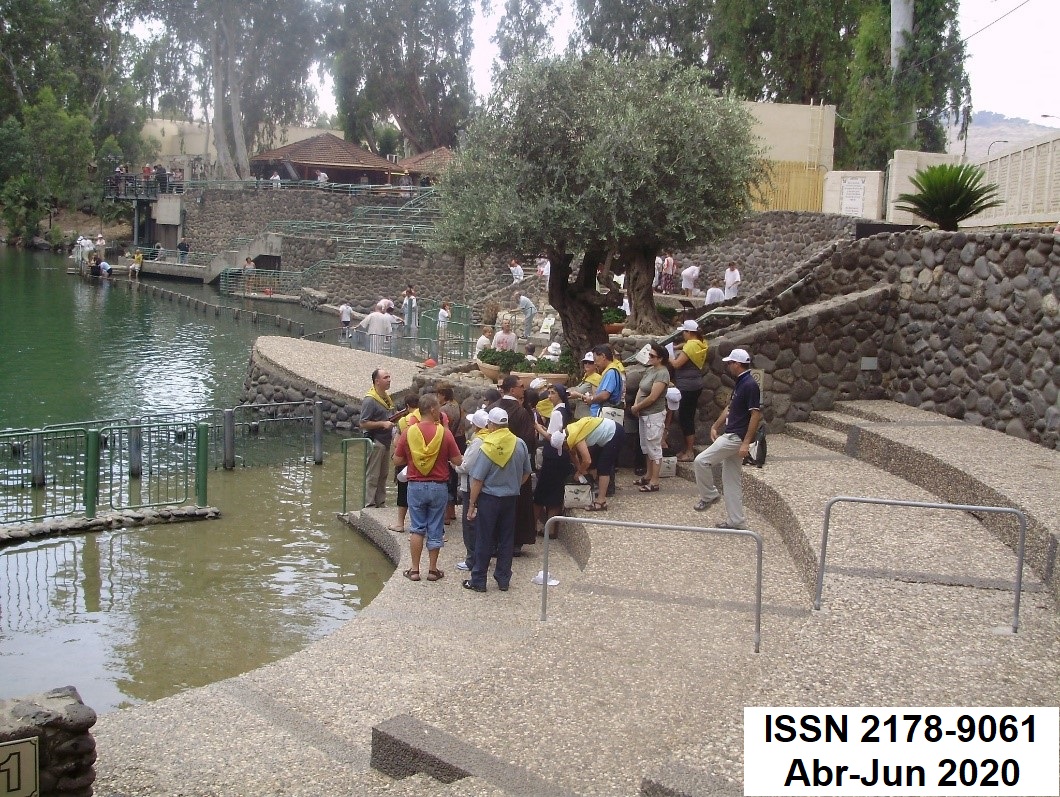Avaliações Negativas de Hotéis: Uma Análise de Dois Importantes Destinos Turísticos de Lazer do Brasil / Negative Hotel Ratings: An Analysis of of Two of Brazil's Top Tourist Leisure Destinations
Palavras-chave:
Hotelaria. Hospitality. Qualidade Percebida. Perceived Quality. Avaliações On-line. Online Reviews. Florianópolis-SC, Rio de Janeiro-RJ. Brasil. BrazilResumo
RESUMO
As avaliações on-line em sites de reservas de hotéis se tornaram uma importante ferramenta de informação e influência para a escolha do meio de hospedagem, além de uma excelente ferramenta para os gestores. O objetivo geral deste estudo é analisar as avaliações negativas de hospedagens no Booking das duas principais cidades turísticas de lazer no Brasil, Rio de Janeiro (RJ) e Florianópolis (SC) e desta forma compreender critérios importantes para o hóspede na escolha de uma hospedagem de lazer. Fez-se uma análise de conteúdo de 918 avaliações, classificando os comentários “muito ruins” conforme as variáveis: quarto de hóspedes, localização, atendimento, preço, segurança, serviço de alimentação, programa de fidelidade de hóspedes e outros. Resultaram 2.537 unidades de texto, cujo o principal resultado mostra os hóspedes preocupados com o atendimento e com questões que envolvem o apartamento do hotel. Atualmente, as mídias sociais estão se transformando em uma ferramenta importante para o turismo, tanto para a decisão do cliente quanto para as redes hoteleiras explorarem estratégias que potencializam a satisfação de seus clientes.
PALAVRAS-CHAVE
Hotelaria. Qualidade Percebida. Avaliações On-line. Florianópolis-SC, Rio de Janeiro-RJ. Brasil
ABSTRACT
On-line evaluations of hotel reservation sites have become an important information and influence tool for the choice of hosting environment, as well as an excellent tool for managers. The overall objective of this study is to analyze the negative accommodation ratings on the Booking of the two main tourist leisure cities in Brazil, Rio de Janeiro (RJ) and Florianópolis (SC) and thus understand important criteria for the guest when choosing a leisure accommodation. There was a content analysis of 918 ratings, rating the comments "very poor" depending on the variables: guest room, location, service, price, security, food service, guest loyalty program and others. The result was 2,537 units of text, the main result of which were guests concerned about the service and issues surrounding the hotel apartment. Today, social media is becoming an important tool for tourism, both for customer decision and hotel chains to explore strategies that enhance customer satisfaction.
KEYWORDS
Hospitality. Perceived Quality. Online Reviews. Florianópolis-SC, Rio de Janeiro-RJ. Brazil
AUTORIA
Samara Jane Effting Vieira – Bacharel. Mestranda, Programa de Pós-Graduação em Turismo e Hotelaria, Universidade do Vale do Itajaí, Balneário Camboriú, Santa Catarina, Brasil. Bolsista CAPES. Currículo: http://lattes.cnpq.br/0627505776662533 E-mail: samyeffting@gmail.com A presente pesquisa teve apoio da Coordenação de Aperfeiçoamento de Pessoal de Nível Superior - Brasil [CAPES], Código de Financiamento 001.
Jaqueline de Souza Brogni – Bacharel. Mestranda, Programa de Pós-Graduação em Turismo e Hotelaria, Universidade do Vale do Itajaí, Balneário Camboriú, Santa Catarina, Brasil. . Bolsista CAPES. Currículo: http://lattes.cnpq.br/6269098460800301 E-mail: jaque-souza@hotmail.com.br
Sara Gadotti dos Anjos – Doutora. Professora no Programa de Pós-Graduação em Turismo e Hotelaria, Universidade do Vale do Itajaí, Balneário Camboriú, Santa Catarina, Brasil. Currículo: http://lattes.cnpq.br/6577619488007785 E-mail: sara@univali.br
Pablo Flôres Limberger – Doutor. Professor na Universidade do Vale do Itajaí, Balneário Camboriú, Santa Catarina, Brasil. Currículo: http://lattes.cnpq.br/3893934127523780 E-mail: pablofl@univlai.br
REFERÊNCIAS
Ban, O. I., & Mester, I. T. (2014). Using kano two dimensional service quality classification and characteristic analysis from the perspective of hotels' clients of Oradea. Journal Of Tourism - Studies and Reserch In Tourism. 18, 30-36. Link
Berezina, K., Bilgihan, A., Cobanoglu, C., & Okumus, F. (2016). Understanding Satisfied and Dissatisfied Hotel Customers: Text Mining of Online Hotel Reviews. Journal of Hospitality Marketing & Management, 25, 1-24. Link
Bilgihan, A.; Barreda, A.; Okumus, F. & Nusair, K. (2016). Consumer perception of knowledge-sharing in travel-related Online Social Networks. Tourism Management, 52, 287-296. Link
Booking (2018). Link
Brasil Escola. (2019). Link
Branco, G. M., Ribeiro, J. L. D., & Tinoco, M. A. C. (2010). Determinantes da satisfação e atributos da qualidade em serviços de hotelaria. Produção, 20(4),576-588. Link
Briggs, S., Sutherland, J., & Drummond, S. (2007). Are hotels serving quality? An exploratory study of service quality in the Scottish hotel sector. Tourism Management, 28, 1006-1019. Link
Buhalis, D., & Law, R. (2008). Progress in information technology and tourism management: 20 years on and 10 years after the Internetdthe state of eTourism research. Tourism Management, 29(4), 609-623. Link
Chan, I. C. C., Lam, L. W., Chow, C. W. C., Fong, L. H. N. F., & Law, R. (2017). The effect of online reviews on hotel booking intention: The role ofreader-reviewer similarity. International Journal of Hospitality Management, 66, 54–65. Link
Chaves, M. S., Gomes, R., & Pedron, C. (2012). Analysing reviews in the Web 2.0: Small and medium hotels in Portugal. Tourism Management, 33(5), 1286-1287. Link
Choo, P. W., & Tan, C. L. (2017). Factors Influencing Poor Experience Quality in 2-To- 5-Star Hotels: A Content Analysis of Guest Reviews on Trip Advisor. Global Business and Management Research: An International Journal, 9(4), 409-425, Link
Cortez, M. C. A., & Mondo, T. S. (2018). Comentários on-line: formação de expectativa e decisão de compra de consumidores hoteleiros. Rosa dos Ventos - Turismo e Hospitalidade, v. 10(1), 119-135. Link
FIPE (2016). Pesquisa de Caracterização e Dimensionamento do Turismo Internacional no Brasil. Relatório de Pesquisa, São Paulo. Link
FloripaSC (2019). Link
Gavilan, D., Avello, M., & Martinez-Navarro, G. (2017). The influence of online ratings and reviews on hotel booking consideration. Tourism Management, 66, 53-61. Link
Gretzel, U., & Yoo, K.H. (2008). Use and impact of online travel reviews. Information and Communication Technologies in Tourism 2008, 35-46. Link
Gundersen, M. G., Heide, M., & Olsson, U. H. (1996). Hotel guest satisfaction among business travelers. Cornell Hotel and Restaurant Administration Quarterly, 37(2), 72-79. Link
Hays, S., Page, S. J. & Buhalis, D. (2013). Social media as a destination marketing tool: its use by national tourism organisations. Current issues in Tourism, 16(3), 211-239. Link
Hsu, Y. L., Chen, K. Y., & Ting, Y. S. (2012). Travel review websites as innovative marketing venues for hotels. The International Journal of Organizational Innovation, 5(2), 179-212. Link
Hudson, S., & Thal, K. (2013). The impact of social media on the consumer decision process: Implications for tourism marketing. Journal of Travel & Tourism Marketing, 30(1-2), 156-160. Link
Hwang, J., Park, S., & Woo, M. (2018). Understanding user experiences of online travel review websites for hotel booking behaviours: an investigation of a dual motivation theory. Asia Pacific Journal Of Tourism Research, 23(4), 359-372. Link
Kandampully, J., Zhang, T. C., & Bilgihan, A. (2015). Customer loyalty: a review and future directions with a special focus on the hospitality industry. International Journal of Contemporary Hospitality Management, 27, 379 - 414. Link
Kim, E. E. K., & Lee, C. H. (2015). How do consumers process online hotel reviews? The effects of eWOM consensus and sequence. Journal of Hospitality and Tourism Technology, 6(2), 113-126. Link
Kim, S. Y., Kim, J. U., & Park, S. C. (2017). The effects of perceived value, website trust and hotel trust on online hotel booking intention. Sustainability, 9(2262), 1-14. Link
Kumar, V., Aksoy, L., Donkers, B., Venkatesan, R., Wiesel, T., & Tilmanns, S. (2010). Undervalued or overvalued customers: Capturing total customer engagement value. Journal of Service Research, 13(3), 297-310. Link
Ladhari, R. (2009). Service quality, emotional satisfaction, and behavioural intentions: A study in the hotel industry. Managing Service Quality: An International Journal, 19(3), 308-331. Link
Lin, Y., & Su, H. (2003). Strategic analysis of customer relationship management - a field study on hotel enterprises. Total Quality Management & Business Excellence, 14, 715-731. Link
Litvin, S. W., & Dowling, K. M. (2016). Tripadvisor and hotel consumer brand loyalty. Current Issues in Tourism, 21(8), 842-846. Link
Martín, J. C., & Roman, C. (2017). Measuring service quality in the hotel industry: The value of user generated content. Turizam: međunarodni znanstveno-stručni časopis, 65(4), 390-405. Link
Meng, F., Dipietro, R. B., Gerdes Jr. J. H., Kline, S., & Avanti, T. (2018). How hotel responses to negative online reviews affect customers’ perception of hotel image and behavioral intent: an exploratory investigation. Tourism Review International, 22(1), 23-39. Link
Munar, A. M., & Jacobsen, J. K. (2014). Motivations for sharing tourism experiences through social media. Tourism Management, 43, 46-54. Link
Pacheco, Luís. (2017). Customer satisfaction in Portuguese hotels: Evidence for different regions and hotel segments. Tourism Analysis, 22(3), 337-347. Link
Radojevic, T.; Stanisic, N., & Stanic, N. (2015). Ensuring positive feedback: factors that influence customer satisfaction in the contemporary hospitality industry. Tourism Management, 51, 13-21. Link
Rasa, S., Lai, C. H., & Indre, S. (2015). Consumer value co-creation in online business: The case of global travel services. Journal of Business Economics and Management, 16(2), 325-339. Link
Ren, L., Zhang, H. Q., & Ye, B. H. (2015). Understanding customer satisfaction with budget hotels through online comments: evidence from home inns in China. Journal of Quality Assurance in Hospitality & Tourism, 16(1), 45-62. Link
Sánchez, D. H. M., & Fernández, J. M. (2017). Análisis de comentarios en redes sociales para mejorar la reputación online hotelera. Turismo y Sociedad, 20, 169-190. Link
Sánchez-Franco, M. J., Navarro-García, A., & Rondán-Catalunã, F. J. (2016). Online customer service reviews in urban hotels: a data mining approach. Psychology & Marketing, 33(12), 1174-1186. Link
Sedera, D.; Lokuge, S.; Atapattu, M., & Gretzel, U. (2017). Likes - The key to my happiness: The moderating effect of social influence on travel experience. Information & Management, 54(6), 825-836. Link
Yang, C. C., Cheng, L. Y., & Sung, D. (2011). Using integrated quality assessment for hotel service quality. Quality & Quantity, 45(2), 349-364. Link
Walls, A. R., Okumus, F., Wang, R. Y., & Kwun, D. J. W. (2011). An epistemological view of consumer experiences. International Journal of Hospitality Management, 30(1), 10-21. Link
Ye, Q., Li, H., Wang, Z., & Law, R. (2012). The influence of hotel price on perceived service quality and value in e-tourism: An empirical investigation based on online traveler reviews. Journal of Hospitality & Tourism Research, 38(1), 23-39. Link
Zeithaml, V. A. & Bitner, M. J. (2003). Services marketing: Integrated customer focus across the firm. New York: McGraw-Hill.
PROCESSO EDITORIAL
Recebido: 15 MAR 19; Avaliado: JUN-AGO. Aceito: 29 SET 19.
Downloads
Publicado
Como Citar
Edição
Seção
Licença
Autores que publicam nesta revista concordam com os seguintes termos:
Os Autores mantém os direitos autorais e concedem à revista o direito de primeira publicação, com o trabalho simultaneamente licenciado sob a Creative Commons Attribution License que permitindo o compartilhamento do trabalho com reconhecimento da autoria do trabalho e publicação inicial nesta revista.
Autores têm autorização para assumir contratos adicionais separadamente, para distribuição não-exclusiva da versão do trabalho publicada nesta revista (ex.: publicar em repositório institucional ou como capítulo de livro), com reconhecimento de autoria e publicação inicial nesta revista.
Autores têm permissão e são estimulados a publicar e distribuir seu trabalho online (ex.: em repositórios institucionais ou na sua página pessoal) a qualquer ponto antes ou durante o processo editorial, já que isso pode gerar alterações produtivas, bem como aumentar o impacto e a citação do trabalho publicado (Veja O Efeito do Acesso Livre).








